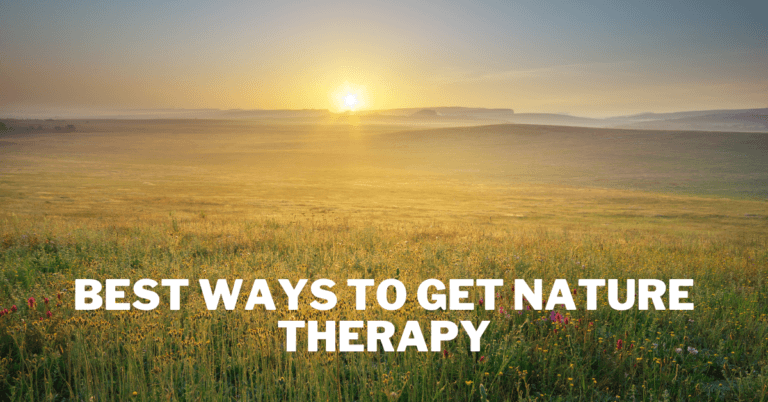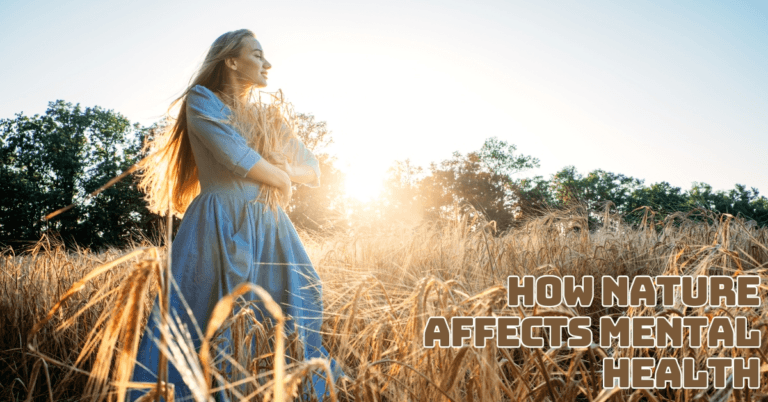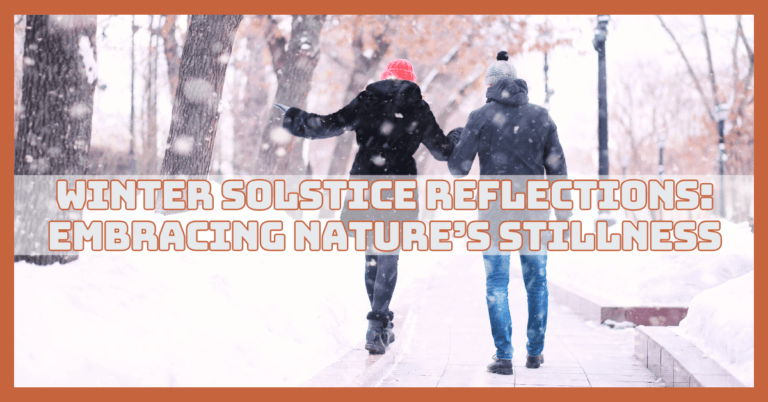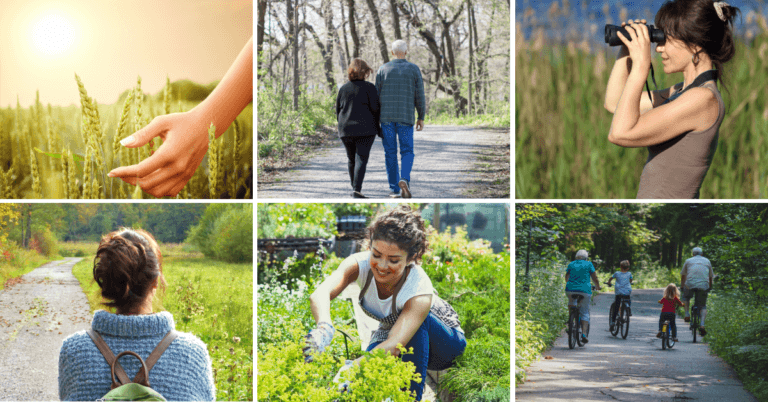How Nature Impacts Our Wellbeing
How Nature Impacts Our Wellbeing
In a fast-paced world dominated by technology and urban landscapes, losing touch with the natural world surrounding us is easy.
However, our innate connection with nature goes far beyond the superficial beauty it offers. Throughout the ages, humans have relied on nature for sustenance, shelter, and inspiration.
But beyond its tangible benefits, nature possesses a remarkable power to impact our overall well-being positively.
In this blog, we delve into the captivating realm of nature and its profound influence on our physical, mental, and emotional health.
From the tranquil serenity of a forest to the refreshing embrace of a sunlit meadow, nature can uniquely heal, restore, and rejuvenate us.
By understanding how spirit intertwines with our well-being, we can harness its therapeutic potential and cultivate a harmonious relationship with the natural world.

How Nature Impacts Our Well-Being
Nature profoundly impacts our well-being, affecting us physically, mentally, and emotionally.
1. Physical Health
Spending time in nature can positively affect our physical health. Such as walking, jogging, or hiking, which can help improve cardiovascular health.
Regular physical activity in nature can help strengthen our hearts and lungs, lower blood pressure, and reduce the risk of cardiovascular diseases.
Exposure to natural sunlight and fresh air in nature can also positively affect our immune system.
Sunlight helps our bodies produce vitamin D, essential for immune function, bone health, and overall well-being.
Fresh air in nature is often cleaner and less polluted, which can help improve respiratory health and boost our immune system.
Nature provides ample opportunities for physical activity, which can help increase our overall fitness levels.
Activities such as hiking, cycling, swimming, or gardening can be enjoyable ways to stay physically active and maintain muscle strength, flexibility, and endurance.
Spending time in nature helps reduce stress levels, which can positively affect our physical health.
Lower stress levels are associated with better cardiovascular health, improved immune function, and reduced risk of chronic diseases such as hypertension and diabetes.
Nature offers a wide range of outdoor recreational activities that can promote physical health and well-being.
For example, hiking or walking on nature trails can provide a good cardiovascular workout, while gardening can improve strength, flexibility, and balance.
These activities can also help reduce sedentary behaviour and promote a more active lifestyle.

2. Mental Health
Nature positively impacts mental health in various ways. Spending time in nature reduces stress.
Being surrounded by natural scenery, such as trees, water, and open spaces, can help lower cortisol levels (the stress hormone) and promote relaxation.
Nature provides a respite from the fast-paced, technology-driven world, allowing our minds to unwind and reset.
Nature has a calming effect on the mind and can help reduce symptoms of anxiety and depression.
Exposure to natural environments has increased serotonin levels, a neurotransmitter associated with mood regulation.
Nature also provides opportunities for physical activity, which can improve mood and reduce symptoms of depression.
Spending time in nature helps to improve cognitive function. Being in natural settings can enhance attention, concentration, and creativity.
Nature provides a stimulating environment for the brain, allowing it to replenish cognitive resources and improve mental clarity.
Nature provides opportunities for connection and social interaction, which is essential for mental health.
Activities such as hiking, camping, or simply spending time in parks can foster social relationships, reduce feelings of isolation, and improve overall well-being.
Nature encourages mindfulness and being present in the moment. When surrounded by the beauty of nature, it is easier to let go of worries about the past or the future and fully immerse oneself in the present moment.
This mindfulness practice can reduce stress and anxiety and promote peace and tranquillity.
3. Emotional Well-Being
Nature has a profound impact on our emotional well-being. Spending time in nature can positively influence our emotions, mental health, and overall well-being.
Nature has a positive effect on our mood. Being in natural surroundings, such as parks, forests, or by the ocean, can help reduce stress, anxiety, and depression and improve our overall mood.
The calming effect of nature, with its sights, sounds, and smells, can help us relax and feel more at ease, leading to an uplifted mood and increased happiness.
Nature can also produce positive emotions, such as joy, awe, wonder, and gratitude. The beauty and grandeur of natural landscapes can inspire a sense of awe and wonder, which can lead to increased positive emotions and well-being.
Nature provides opportunities for sensory experiences, such as feeling the sun's warmth, the touch of grass or sand, birds chirping, or the smell of flowers, which can all contribute to positive emotions.
Nature offers opportunities for solitude and reflection, which can benefit our emotional well-being.
Being in natural settings can provide a sense of escape from the hustle and bustle of daily life and allow us to disconnect from technology and external distractions.
This can create space for introspection, self-reflection, and mindfulness, helping us gain perspective and clarity.
Nature can also help us connect with our inner selves. Being in nature can create a sense of connection with something larger than ourselves, whether it's the vastness of the ocean, the majesty of a mountain, or the serenity of a forest.
This connection can foster self-awareness, self-acceptance, and a deeper understanding of ourselves, contributing to emotional well-being.

4. Social Connections
Nature can facilitate social connections, which are crucial to our overall well-being. Spending time in nature with family and friends can foster bonding and create shared experiences, leading to stronger relationships.
Nature-based activities, such as group hikes, camping trips, or even simple picnics in the park, can promote social interaction, communication, and cooperation among individuals, essential for healthy social connections.
One of the reasons why nature can facilitate social connections is that it provides a unique and conducive environment for people to connect and interact with one another.
Nature often offers a serene and calming atmosphere that can help people relax, lower their stress levels, and create a sense of openness and connectedness with others.
Being in nature can also encourage people to engage in physical activities like hiking, biking, or playing outdoor games, fostering teamwork and cooperation.
Moreover, nature-based activities can provide a shared purpose or goal, bringing people together and creating a sense of camaraderie.
For example, embarking on a group hike or camping trip requires planning, coordination, and teamwork, which can promote communication, problem-solving, and bonding among participants.
Such shared experiences in nature can create lasting memories and stories that can be shared and reminisced upon, strengthening the social bonds among individuals.
Nature also offers ample opportunities for meaningful conversations and quality time spent with family and friends.
Away from the distractions of modern technology and busy urban environments, being in nature allows people to connect on a deeper level, engage in meaningful conversations, and build emotional connections.
This can promote understanding, empathy, and relationship intimacy, increasing closeness and social support.
5. Restoration And Resilience
Nature has a unique ability to restore and enhance our mental and emotional well-being. Exposure to natural environments can be vital, helping us recover from mental fatigue and stress.
Nature provides a respite from the demands of daily life and offers a sense of calm, tranquillity, and beauty that can help us recharge and rejuvenate.
Spending time in nature can replenish our cognitive resources and improve our ability to focus and concentrate.
Nature provides a soothing environment that can help reduce mental fatigue caused by prolonged attention to screens, work, or other stressors.
Time spent in nature, such as walking in a park, hiking in the woods, or simply sitting by the beach, can help restore our attentional capacities and improve our cognitive performance.
Nature can also have a positive impact on our mood and emotional well-being. Being in nature has been shown to reduce stress, anxiety, and depression and increase positive emotions such as happiness and awe.
The sounds, smells, and sights of nature can evoke positive emotions and create a sense of awe and wonder, which can help elevate mood and promote emotional resilience.
Nature also offers opportunities for physical activity and exercise, which has numerous benefits for mental health and well-being.
Engaging in outdoor activities such as hiking, biking, or gardening can provide a natural way to exercise and improve our physical health, contributing to our mental well-being.
Physical activity in nature has been shown to reduce symptoms of anxiety and depression, improve mood, and boost overall psychological well-being.

6. Environmental Well-Being
Environmental well-being is the concept that our overall well-being is closely tied to the health of the environment in which we live.
Nature provides many essential ecosystem services fundamental to our survival and well-being.
Clean air is one of the most critical ecosystem services provided by nature. Trees and other plants absorb carbon dioxide and release oxygen through photosynthesis, which helps purify our air.
Forests, grasslands, and other natural habitats act as natural filters, helping to remove pollutants from the air and improving air quality. Breathing clean air is essential for our respiratory health and overall well-being.
Clean water is another essential ecosystem service provided by nature. Rivers, lakes, wetlands, and other natural water bodies act as natural filters, helping to remove pollutants and impurities from water.
Healthy ecosystems play a crucial role in maintaining water quality, ensuring we have access to safe drinking water, and supporting aquatic ecosystems vital for biodiversity and food production.
Nature also provides us with food, a fundamental aspect of our well-being. Healthy ecosystems, such as fertile soils, pollinators, and diverse plant and animal species, are essential for agriculture and food production.
Sustainable farming practices, such as agroecology and organic farming, promote healthy ecosystems, protect biodiversity, and ensure that we have access to nutritious and safe food for our well-being.
Caring for and protecting nature through conservation efforts and sustainable practices is crucial for ensuring the health of our environment and maintaining these ecosystem services for current and future generations.
Conservation efforts, such as protecting natural habitats, restoring degraded ecosystems, and promoting sustainable resource management, are essential for maintaining the balance and functioning of ecosystems that provide clean air, water, food, and recreational opportunities.
7. Stress Reduction
Spending time in nature has been shown to significantly impact reducing stress levels, which is crucial for our overall well-being.
Nature provides a calming environment to help lower cortisol, a stress hormone, and promote relaxation.
One of the reasons why nature can help reduce stress is due to the sensory experiences it offers.
The sights, sounds, smells, and textures of natural environments can have a soothing effect on our minds and bodies.
For example, listening to the sounds of birdsong, rustling leaves, or flowing water can help create a sense of tranquillity and calmness.
The visual beauty of natural landscapes, such as lush green forests, serene lakes, or breathtaking mountain vistas, can also evoke positive emotions and help reduce stress.
Being in nature also allows for disconnecting from the fast-paced, technology-driven world and engaging in activities that promote relaxation and mindfulness.
Activities such as walking, hiking, or simply sitting in a natural setting can help clear our minds, reduce mental fatigue, and allow us to be fully present in the moment. This can help break the cycle of stress and worry, allowing us to recharge and rejuvenate.
Nature also offers a respite from the urban environment, often associated with stress and sensory overload.
Urban environments can be noisy, polluted, and demanding, increasing stress levels.
In contrast, spending time in nature provides a counterbalance, offering a quiet, peaceful, and refreshing space where our senses can relax and reset.
Spending time in nature has numerous physiological benefits that contribute to stress reduction.
For example, exposure to nature can help lower cortisol levels, a hormone released in response to stress.
Lower cortisol levels are associated with reduced stress and anxiety, improved mood, and better overall mental health.

8. Attention Restoration
Nature positively impacts attention restoration, which is crucial for cognitive well-being. In today's fast-paced, technology-driven world, our attention is often constantly divided and overstimulated, leading to mental fatigue and reduced cognitive performance.
However, spending time in nature can provide a much-needed break from this constant stimulation, allowing our minds to rest and recharge and ultimately improving our ability to concentrate, focus, and think creatively.
One of the key reasons why nature can help restore our attention is the concept of “attention restoration theory” (ART).
ART suggests that nature provides a refreshing environment that allows our directed attention, which is required for tasks that require concentration and focus, to recover.
Nature has inherent qualities, such as natural beauty, unpredictability, and complexity, that capture our attention gently and effortlessly.
This soft fascination allows our directed attention to take a break, which can help replenish our cognitive resources and restore our ability to concentrate and focus.
Spending time in nature often involves physical activities, such as walking, hiking, or outdoor recreation, which can further restore attention.
Physical activity has been shown to have numerous cognitive benefits, including improved cognitive function, increased creativity, and enhanced memory.
When combined with the therapeutic effects of nature, physical activity in natural environments can synergistically affect attention restoration, helping to improve our overall cognitive performance.
Nature provides an opportunity for a digital detox, allowing us to take a break from screens and the constant notifications that demand our attention in the modern world.
This break from technology can help reduce cognitive overload and give our minds the space to rest and recover from the mental fatigue of constant screen time.
Spending time in nature can help us disconnect from our devices and be fully present at the moment, allowing for better attention restoration and cognitive functioning.

9. Mindfulness And Presence
Nature uniquely draws us into the present moment and promotes mindfulness, which is a non-judgmental awareness of the present moment.
When we are in nature, we naturally shift our attention to our surroundings, engaging our senses and immersing ourselves in the natural world's sights, sounds, smells, and textures.
This sensory experience can help us cultivate a deeper connection with ourselves, others, and the world, promoting a sense of grounding and well-being.
One of the reasons why nature promotes mindfulness and presence is that it provides a respite from the constant distractions and multitasking of our modern lives.
In nature, we can disconnect from technology, noise, and other external stimuli that often pull us away from the present moment.
This allows us to fully immerse ourselves in the sensory experience of nature, such as listening to the rustling leaves, feeling the breeze on our skin, or observing the intricate details of a flower.
This heightened sensory awareness can bring us into the present moment and help us cultivate mindfulness as we become fully attuned to our immediate surroundings without judgment or interpretation.
Nature also offers a sense of awe and wonder, enhancing mindfulness and presence.
The vastness of the natural world, the beauty of natural landscapes, and the diversity of flora and fauna can evoke a sense of awe and amazement.
When we are in a state of awe, our minds are naturally drawn into the present moment as we are captivated by the magnificence of nature.
This sense of fascination can help us let go of worries about the past or future and bring our attention fully to the present, fostering mindfulness and a deeper sense of connection with the world around us.
Conclusion
Spending time in nature helps to have a positive impact on our well-being. It provides opportunities for physical exercise, fresh air, and immune-boosting benefits.
Nature also promotes emotional well-being by reducing stress, increasing happiness, and fostering a sense of connection and belonging.
Additionally, nature has therapeutic properties, improving cognitive function and creativity.
However, it's important to address barriers to access and ensure that everyone can enjoy the benefits of nature for their well-being. Prioritizing time in nature can greatly enhance our overall health and well-being.
I trust you enjoyed this article on How Nature Impacts Our Wellbeing. Please stay tuned for more blog posts to come shortly. Take care!
JeannetteZ
>>>Please click here to read my all-inclusive article about A Comprehensive Guide To Healing Naturally<<<
>>>Are you interested in Natural Healing through Herbs? Please click here for my #1 Recommendation<<<
Your Opinion Is Important To Me
Do you have thoughts, ideas, or questions? I would love to hear from you. Please leave me your questions, experiences, and remarks about this article on How Nature Impacts Our Well-Being in the comments section below. You can also email me at Jeannette@Close-To-Nature.org.
Disclosure
This post may contain affiliate links. I earn from qualifying purchases as an Amazon Associate and other affiliate programs. Please read my full affiliate disclosure.
You might also enjoy these blog posts:
Lessons That Will Teach You All About Stress
The Top Most Important Container Gardening Tips
A Comprehensive Guide To Healing Naturally
Best Ways To Grow Tamarind In Your Home Garden








